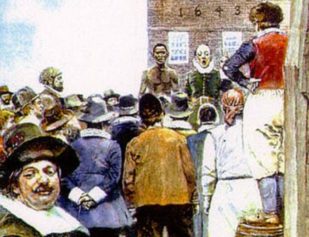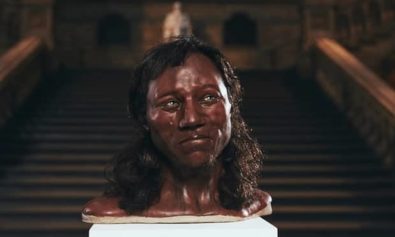
At least 12 enslaved workers are believed to have been sold at the auction block in downtown Fredericksburg. (Image courtesy of Getaway Mavens)
In the wake of deadly violence that broke out over a Confederate statue in Charlottesville, Va., early last month, officials in the town of Fredericksburg are struggling with what to do with an equally dark historic symbol: a slave auction block.
The site, located on the corner of William Street and Charles Street, is marked by a grayish-brown stone sticking out from the sidewalk that’s almost the size of an overturned bucket, according to The Guardian. A bronze plaque at it base reveals that the stone was once used to auction off enslaved Blacks.
For many, the most common reaction after learning of the stone’s controversial history is to remove it, throwing it into the growing heap of flags, statues and monuments honoring the Confederate South. Just last week, Fredericksburg residents launched a petition demanding city officials to remove the “blatant symbol of slavery.”
So far, the document had gained over 2,500 signatures.
“We, as a modern society, have had enough of this stone symbol of bigotry; let us have it removed from our beautiful downtown neighborhood,” the petition reads. “Display it in a museum if you wish, but this vile monument does not belong on a public street corner as a constant reminder of the hatred that once filled this town, state and nation which we call our home.”
Despite their efforts, the controversial auction block will likely remain unmoved, according to The Guardian. While there are residents who feel the block should be removed at once, there are others who consider the slave bock to be categorically different from Confederate monuments and statues honoring Civil War generals.
“In this discussion, we are talking about what is the history,” Fredericksburg Mayor Mary Katherine Greenlaw told the newspaper. “We’re not talking about a memorial or something that is after the fact or a glorification. This is the history. That is the spot. This is the significant distinction.”
Those like Greenlaw who say that the block should stay put argue that removing it would give racists the privilege of forgetting history, rather than dealing them a blow. City councilman and CivilWar re-enactor Matt Kelly said viewing symbols like the auction block often make people uncomfortable — which isn’t always a bad thing.
“We feel uncomfortable because it represents something that we never want to see again,” Kelly said. “Hopefully, it reinforces in us the sense that we all have a role in making sure that it never happens again.”
Today, it’s known that at least 12 enslaved workers were sold on the street corner auction block, The Guardian reported.
Last week’s petition is just the latest effort by locals to have the block removed. The first came in 1924 when the Fredericksburg Chamber of Commerce went before the City Council to demand that it be taken down. At the time, officials argued that the site had never been used to sell enslaved Blacks and that such an assertion made the town look bad.
“The communication states that the rock was not a slave block,” a 1924 article in the Daily Star read, “but was used years ago as a base for ladies to mount horses, and by its display to tourists as a place of selling slaves, it may serve somewhat to keep alive the sectional feeling which has long since disappeared.”
The block very well may have initially been used for mounting horses. However, an old newspaper ad pulled by local auctioneer N.B. Kinsey proved that the street corner block was indeed used to auction off slaves, according to The Guardian. From then on, the debate over the block fell silent.
Those most affected by the block say they’re simply tired of walking past it everyday, as it’s an egregious symbol and constant reminder of pain for local African-Americans.
“I personally don’t need something like that to remind me of what my ancestors had endured,” said the Rev Hashmel Turner, who attended a small prayer vigil around the auction block earlier this month.
“If you want healing, why would you continue to leave obstacles in place that remind you of the suffering? You can’t heal if you always have the reminder.”


